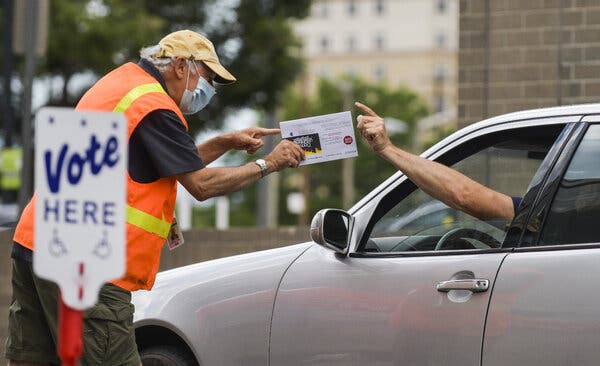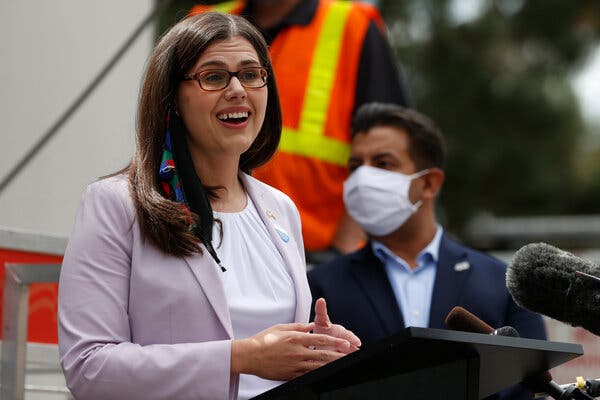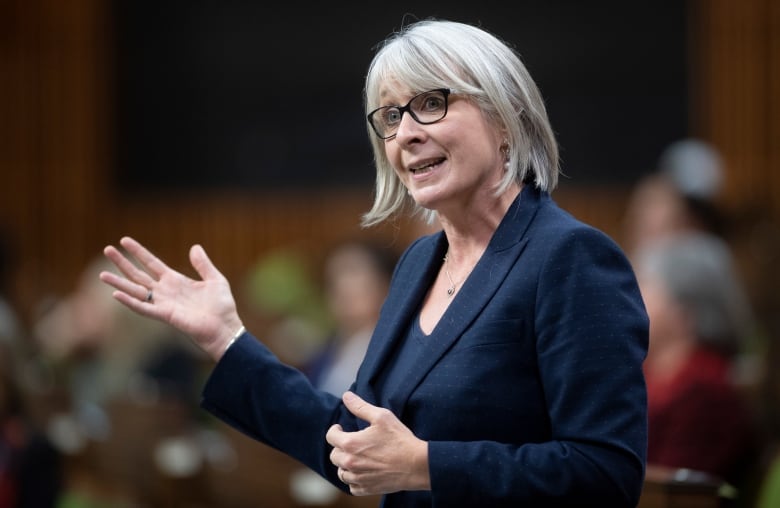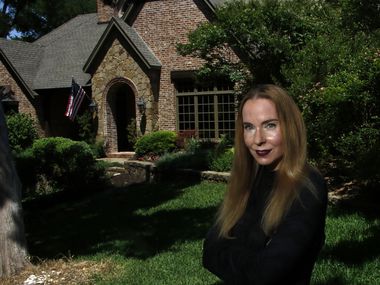Advertisement
The suit comes as the Postal Service has drawn scrutiny for a mail delivery slowdown that Democrats have charged are part of an effort by President Trump to hobble mail-in voting to bolster his re-election.

Colorado’s top election official filed a federal lawsuit on Saturday against the postmaster general and other Postal Service leaders, claiming that a mailer sent to voters in the state was an attempt to disenfranchise them by offering misleading information about how to vote by mail.
The lawsuit, initiated by Jena Griswold, the secretary of state of Colorado, in Federal District Court, is the latest indication of broad concerns that have emerged in recent weeks over how the leadership of the Postal Service, including a group of Republicans installed by President Trump, is preparing for what is expected to be a record number of mail-in ballots in the run-up to November’s election.
Democrats have expressed worry that under the stewardship of Louis DeJoy, a Republican megadonor and a supporter of Mr. Trump’s, the agency is working to undermine voting by mail, which the president has assailed as fraudulent and a way to rig the election against him.
The Postal Service “intends to mail an official notice to all Colorado voters that provides false statements about voting in Colorado,” the lawsuit states. “These false statements will disenfranchise Colorado voters, including its uniform military and overseas voters; mislead them about Colorado’s election procedures; infringe Colorado’s constitutional rights to conduct its elections; and interfere with the secretary of state’s ability to oversee Colorado elections.”
But even as the Postal Service defended its mailer as an attempt to ensure that voters send their ballots with ample time for them to be processed, Mr. Trump continued his attacks on voting by mail, signaling that he had no plans to stop promoting baseless claims in the final weeks of the election.
“The Unsolicited Mail In Ballot Scam is a major threat to our Democracy, & the Democrats know it,” the president wrote on Twitter, undercutting the Postal Service’s defense. “Almost all recent elections using this system, even though much smaller & with far fewer Ballots to count, have ended up being a disaster. Large numbers of missing Ballots & Fraud!”
After Ms. Griswold announced the lawsuit, secretaries of state from five other states contacted her office to request copies so they could explore the possibility of filing their own suits, she said in an interview on Saturday. She said that when she had first learned of the mailer a few days ago, she had contacted Postal Service officials to ask them not to send it to Colorado addresses but had been rebuffed. She said she was also seeking a restraining order barring the Postal Service from continuing to send the mailer into her state, a request a federal court granted later Saturday.
“They know that they’re about to send misinformation to millions of voters in the 2020 election, where we’re getting a constant flow of misinformation and undermining of the elections from the White House,” she said in the interview.

The Postal Service sent the mailer as part of a campaign to reassure voters of its ability to handle a surge in voting by mail as a result of the pandemic and to quell criticism that its leaders were trying to sabotage voting by mail before the election. The mailer does not encourage voting by mail, though it does encourage those who opt to do so to send their ballots early.
But the information in the mailer is broad, and it does not account for differences in state rules, angering top elections officials in several jurisdictions. Places like Colorado, for instance, automatically send all voters mail-in ballots.
A spokesman for the Postal Service said in a statement that the mailer was intended to provide “general, all-purpose guidance on the use of the mail, and not guidance on state election rules.”
“We are aware that each state has its own specific rules, deadlines and requirements, and the mail piece acknowledges that fact,” the spokesman, David A. Partenheimer, said. He added, “The Postal Service’s guidance remains that individuals need to understand their state’s rules and deadlines, and to plan ahead.”
As Mr. Trump has railed against mail-in voting and Mr. DeJoy has come under fire for cost-cutting measures that have slowed mail delivery, the agency has begun an advertising campaign, including a television spot, intended to assuage concerns about its ability to process the anticipated surge in voting by mail. Some postal officials have cautioned against appearing to encourage the practice.
Some voters — including about 1,000 in Colorado, according to Ms. Griswold — started receiving the mailers in recent days. The mailer, which was sent to all 50 states and the District of Columbia, is set to be delivered to 161 million addresses to which the Postal Service delivers, according to a person familiar with the plans who insisted on anonymity to describe them. It encourages voters to request an absentee ballot at least 15 days before the election.
But nine states and the District of Columbia are mailing absentee ballots to every registered voter, making it unnecessary for the voters to request one. In nine other states, election officials are mailing an absentee ballot request to every registered voter.
In Maryland, the top election official, Linda Lamone, told the state board of elections that she and leaders of other states discussed the mailer on a call Friday and are trying to block the Postal Service from sending any more.
“I’m trying to stop the mailing of this postcard to Maryland residents, because it’s only going to cause mass confusion,” Ms. Lamone said. “I’m very disappointed that the national Postal Service would do that. My colleagues around the country are infuriated, as we all should be.”
One board member asked why the Postal Service would listen.
“Because we’re all mad,” Ms. Lamone said.
Lee Moak, a Democratic appointee to the Postal Service’s board of governors, pushed back Saturday on the suggestion that the mailer was confusing, and said it was meant to help voters intending to vote by mail, regardless of where they lived.
“The mailer was not misleading,” Mr. Moak, who is the chairman of the board’s election mail committee, which was involved in putting together the plan for the mailer, said in an interview.
He added that the mailer provides the address of a Postal Service website that directs users to individual states’ election administration bodies.
The Postal Service has been warning states for months that it may not be able to meet their deadlines for delivering last-minute mail-in ballots. Postal officials said the letter was the agency’s attempt to take the message directly to the voters to ask them to request their mail-in ballots early and avoid waiting until the week before the election to send them back.
“We recommend you mail your ballot at least seven days before Election Day,” the mailer states.
But Ms. Griswold said she had recommended at least eight days, which she said was the length of time that it could take for mail to be delivered from an Indian reservation in Colorado, and asserted that the Postal Service should have consulted state election leaders before sending the mailer.
“This may have started off as a well-intentioned effort by @USPS, but their refusal to listen to election experts combined with the recent postal slowdown in some parts of the country is beyond suspect,” Ms. Griswold wrote on Twitter.
In the order granting Ms. Griswold’s request to temporarily bar the mailer from being sent to more addresses in Colorado, Judge William J. Martínez of Federal District Court wrote that he was “deeply troubled” by the Postal Service’s conduct as characterized by Colorado’s lawsuit. He wrote that the postcard could “sow confusion amongst voters by delivering a contradictory message” and that it “likely interferes with Colorado citizens’ fundamental right to vote.”
The secretary of state in Washington also took to Twitter to correct statements in the mailer.
“You may soon receive a mailer from USPS encouraging you to request your mail-in ballot,” the message said. “WA voters DO NOT need to request an absentee ballot. Ballots are automatically mailed to all active registered voters at least 18 days prior to Election Day.”
Kim Wyman, the Washington secretary of state, said neither her office nor county election officials had been told that the mailer would be sent to residents, nor had they been told what it would say.
“By the time we learned of the mailer and reached out to the Postal Service to inquire further, the mailers were already in the mail stream,” she said in a statement.
Hailey Fuchs contributed reporting.
Updated Sept. 12, 2020
-
The Latest
-
President Trump has failed to erase Joseph R. Biden Jr.’s lead across a set of key swing states, according to a poll conducted by The Times and Siena College.
-
-
Paths to 270
-
Voting Deadlines
-
Keep Up With Our Coverage

